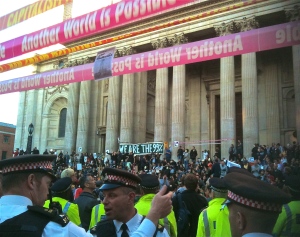Rajeev Thacker analyses the High Court decision in the St Paul’s protestors case.
 In the course of giving his judgment in the St Paul’s Occupy London case Lindbolm J said this:
In the course of giving his judgment in the St Paul’s Occupy London case Lindbolm J said this:
“No one has doubted, or could, the significance of the causes the defendants promote, or the sincerity and passion with which they are doing this.”
But despite what I would suggest is the obvious wider importance of the movement, can it be said that the legal aspects of the case broke new ground? Or was it a question of applying well-settled principles to a highly-publicised set of facts?
As is now well-known, the City of London Corporation sought a possession order against the St Paul’s protestors so as to remove the encampment of tents from various areas immediately outside the cathedral. As the judge pointed out, much of the evidence was not in dispute, for example, that the camp caused an obstruction of the highway, albeit not one which prevented the passage of pedestrians. The judge went on to find that the occupation amounted to an unreasonable obstruction of the highway. It constituted an “indefinite” rather than “transitory” obstruction and thereby deprived the public of the use of the highway. The crucial issue, therefore, was whether the defendants could, based on Articles 10 and 11 of the European Convention (the rights to freedom of expression and freedom of assembly) trump the Corporation’s otherwise unqualified right to possession.
The judge decided that the factors in favour of granting a remedy to the Corporation outweighed the rights of the protestors for a number of reasons:
- The continued presence of the protest camp was at odds with the wide powers granted by Parliament to local authorities insofar as highways were concerned.
- The activities of Occupy London interfered substantially with the Article 9 rights of those who wished to worship in the cathedral.
- The camp had adversely impacted upon the local drainage system, caused nuisance through both noise and smell and damaged the trade of local businesses, as well as causing an increase in anti-social activity.
- The protestors had been given sufficient time to make their point and, if the court did not intervene, there would be no set date for their removal.
Ultimately, therefore, the judge held, applying well-established principles from the Court of Human Rights, that the interference with the protestors’ rights was in accordance with a pressing social need. Furthermore, the order sought, which was to remove the camp and to prevent it from being re-established in the vicinity of the cathedral, was proportionate.
It is of note that the judge considered that the factors in favour of the Corporation “easily” outweighed the counter-arguments and, furthermore, viewed the claimant’s case as “unusually persuasive”. From a purely legalistic point of view, I would suggest that the result was relatively unremarkable. The judge made findings of fact in favour of the Corporation and decided that the balance fell clearly on its side.
Nevertheless, there are important political and social ramifications. The judge was keen to stress that it was not his role to decide any wider questions but, as the growth of public law has illustrated, it is almost impossible for the courts not to become involved in the larger issues raised by cases of this type. To give just one example, the judge’s order prohibits anybody from conducting any protest, even a transitory one, outside St Paul’s if that person erects a symbolic tent. This is despite the fact that the Corporation expressly disavowed any suggestion that it was seeking to curtail limited protest. Is not the width of such an order a political statement in itself, suggesting that property rights trump those of peaceful protest?
The protestors are seeking permission to appeal and have until 25th January to do so. It seems that the crux of their argument will be that the judge failed to properly address the proportionality issue. In other words, was the order obtained by the Corporation the least intrusive means of dealing with the conduct of the protestors, bearing in mind their Convention rights? It must be at least arguable that the order is too wide, given the example above, and there is a real danger that it will prevent others from protesting, even when they are not causing any harm. If nothing else, the Occupy movement has illustrated how important it is that we need to jealously guard our right to protest and, for this reason, it is to be hoped that the Court of Appeal decides to consider the issue further.

Nice blog and very good article….